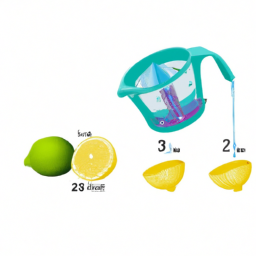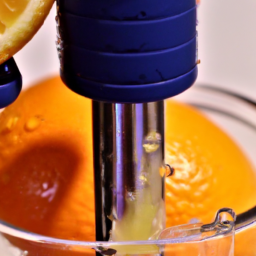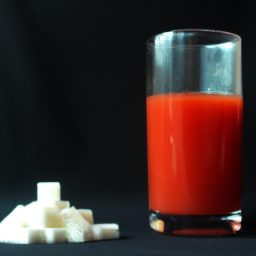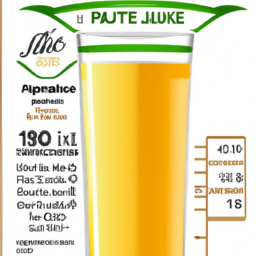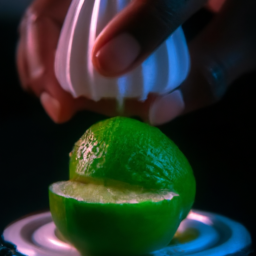Have you ever thought about how much juice a single lemon can produce? Lemons are renowned for their tangy and tart flavor, adding a burst of freshness to drinks and desserts.
As a professional chef and culinary enthusiast, I’ve spent countless hours experimenting with different techniques to extract the maximum amount of juice from these bright yellow fruits. In this article, I’ll share with you everything you need to know about getting the most juice out of your lemons – from the factors that affect yield to the tools and equipment you’ll need, and much more.
Lemons are not only delicious but also incredibly versatile, making them a staple ingredient in kitchens around the world. Whether you’re making lemonade, salad dressing, or a classic lemon tart, it’s important to know how much juice you can expect to get from each lemon. But as any seasoned cook will tell you, the amount of juice you can extract from a lemon can vary widely depending on several factors, such as the age and variety of the fruit, the temperature of the fruit, and the technique you use to extract the juice.
By understanding these variables and following a few simple tips and tricks, you can ensure that you always get the most juice possible from your lemons.
Key Takeaways
- The amount of juice yield from one lemon varies based on factors such as age, variety, temperature, and juicing technique.
- On average, one lemon yields 2-3 tablespoons of juice, but this can be influenced by the size and ripeness of the lemon.
- Cold lemons yield less juice, so it’s best to use them at room temperature.
- Lemon juice has health benefits and can be used to add flavor to various recipes.
Factors that Affect Lemon Juice Yield
Did you know that the amount of juice in one lemon can vary depending on factors like its ripeness and temperature? These variables can greatly affect the lemon juice extraction process, which in turn affects how much juice you’ll get from each lemon.
For example, unripe lemons tend to have less juice and a more sour taste due to their higher acidity levels. On the other hand, ripe lemons are less acidic and contain more juice, resulting in a sweeter taste.
Temperature also plays a role in the amount of juice extracted from lemons. When lemons are warmed to room temperature, they tend to yield more juice than when they are cold. This is because the heat loosens the cells in the lemon, making it easier to extract the juice.
Knowing these factors can help you get the most out of your lemons, ultimately leading to a better end product. That’s why it’s important to choose the right lemon for your needs.
The Importance of Choosing the Right Lemon
Hey, you there! You wouldn’t want to end up with a sour face, now would you? That’s why it’s crucial to carefully select the ideal lemon for your needs. Here are some things to keep in mind when choosing fresh lemons:
-
Lemon Varieties: There are many types of lemons, each with its own unique flavor and juice yield. Meyer lemons, for example, are sweeter and have less acidic juice compared to Eureka lemons. It’s important to choose the variety that best suits your recipe.
-
Look for Firmness: Look for lemons that are firm and heavy for their size. This indicates that they are juicy and fresh.
-
Check the Skin: The skin of a lemon should be smooth and brightly colored. Avoid lemons with dull, wrinkled, or discolored skin, as these are signs of age and may have less juice.
Choosing the right lemon is just the first step in making the perfect lemon juice. Once you’ve got your lemons, the next step is to gather the tools and equipment you’ll need.
Tools and Equipment You’ll Need
To ensure a successful lemon juice, it’s crucial to have the appropriate tools and equipment. These include a citrus juicer, a fine-mesh strainer, and a sharp knife.
There are different juice extraction methods that can be used to extract the juice from lemons. These include manual squeezing, using an electric juicer, or a citrus press. However, for the best results, a citrus juicer is recommended as it can extract almost all the juice from the fruit without introducing any bitterness from the pith.
A fine-mesh strainer is also essential to remove any pulp or seeds from the juice, leaving only the clear liquid.
When it comes to choosing the right lemon for juicing, it’s important to select a variety that is high in juice content and low in acidity. Meyer lemons are a popular choice for juicing as they are sweeter and have a higher juice content than other varieties. Additionally, it’s important to ensure that the lemons are ripe and not overly soft or hard.
With the proper tools and equipment, and the right choice of lemons, you can make the perfect lemon juice for your needs.
In preparation for cutting the lemons, it’s recommended to wash them thoroughly before slicing them in half. From there, different cutting techniques can be used to extract the juice, such as manually squeezing the lemon by hand or using a citrus press.
Preparation and Cutting Techniques
Now that you’ve got your tools ready, let’s talk about how to prepare and cut your lemons for juicing.
When it comes to lemon juicing techniques, there are a few options to consider. The first step is to wash the lemons thoroughly to remove any dirt or debris on the skin.
Then, you can either cut the lemon in half crosswise or lengthwise. Cutting the lemon crosswise will give you more surface area to work with, while cutting it lengthwise will give you larger pieces to squeeze.
Once you’ve cut your lemons, the next step is to extract the juice. Lemon juice extraction methods vary depending on personal preference and the tools available.
Some people prefer to hand-squeeze their lemons, while others use a juicer. Hand-squeezing can be more time-consuming, but it allows for more control over the amount of juice extracted.
Using a juicer can be faster and more efficient, but it may not extract as much juice as hand-squeezing.
Hand-Squeezing vs. Using a Juicer
If you really want to savor the freshness and tanginess of your lemon juice, hand-squeezing is the way to go. Although it may take a bit more time and hand strength, the result is worth it. Hand-squeezing ensures that you get all of the juice out of the lemon, without any of the bitter oils that can be released when using a juicer. Plus, it’s a great arm workout!
However, if you’re short on time or have a lot of lemons to juice, using a juicer can be a more time-efficient option. Just make sure to choose a high-quality juicer that doesn’t heat up the juice, as heat can destroy some of the beneficial enzymes and nutrients in the lemon juice.
Now that we’ve covered the pros and cons of hand-squeezing vs. using a juicer, let’s move on to how to get the most juice out of your lemons.
How to Get the Most Juice Out of Your Lemons
Get the most bang for your buck with your lemons by treating them like a stress ball and giving them a good squeeze until they give up every last drop of their citrusy goodness. When it comes to juicing hacks, there are a lot of myths out there about how to get the most juice out of your lemons. Some people believe that microwaving them or rolling them on a hard surface before cutting them open will yield more juice, but there is little scientific evidence to support these claims.
To get the most juice out of your lemons, start by making sure they are at room temperature. Cold lemons are harder to squeeze and will yield less juice. Next, cut the lemon in half and use a citrus juicer to extract the juice. If you don’t have a juicer, you can also use a fork or a lemon squeezer to manually extract the juice. Finally, use a strainer to remove any seeds or pulp before using the juice in your favorite recipe. By following these simple steps, you can ensure that you are getting the most juice out of your lemons every time.
When it comes to storing and preserving lemon juice, there are a few tips and tricks that can help prolong its shelf life.
Tips for Storing and Preserving Lemon Juice
When you have a surplus of lemon juice, it’s important to know how to store it properly so it doesn’t go to waste. Here are some tips for storing and preserving lemon juice:
-
Freezing Methods: Lemon juice can be frozen in ice cube trays or freezer-safe containers. Once frozen, transfer the cubes or containers into a freezer bag for long-term storage. This method is great for preserving the freshness of lemon juice and can be used for up to 6 months.
-
Citrus Alternatives: If you don’t have lemons on hand or want to mix up the flavors, consider using other citrus fruits like limes or oranges as a substitute. These fruits offer similar acidic and sweet flavors that can be used in a variety of recipes.
-
Refrigeration: If you plan to use your lemon juice within a few days, it can be stored in an airtight container in the refrigerator. This method is best for short-term storage and will help preserve the flavor and freshness.
-
Acidification: Adding a small amount of citric acid to your lemon juice can help extend its shelf life. This method is often used in commercial settings and can be useful for home cooks who want to store larger quantities of lemon juice for longer periods of time.
Knowing how to store and preserve your lemon juice can save you time and money in the long run. With these tips, you can ensure that your lemon juice stays fresh and flavorful for all your cooking needs.
Speaking of lemon juice, have you ever wondered how much juice you can expect to get from one lemon?
How Much Juice You Can Expect to Get from One Lemon
Lemons, like a magician’s hat, hold an impressive amount of liquid that can add a burst of tangy flavor to any dish. But just how much juice can you expect to get from one lemon? The answer varies depending on the size and ripeness of the lemon, as well as the juicing method used. However, on average, you can expect to get about 2-3 tablespoons of juice from one lemon.
To give you a better idea of the amount of juice you can get, take a look at the table below:
| Lemon Size | Amount of Juice |
|---|---|
| Small | 1-2 tablespoons |
| Medium | 2-3 tablespoons |
| Large | 3-4 tablespoons |
While it may not seem like a lot, this amount of juice can go a long way in adding flavor to your dishes. Lemon juice can be used in a variety of recipes, from salad dressings to marinades to desserts. Additionally, lemon juice has numerous health benefits, including aiding digestion, boosting the immune system, and even helping to prevent kidney stones. So next time you’re in the kitchen, don’t underestimate the power of one little lemon.
Now that you know how much juice you can expect from one lemon, what should you do with all those leftover lemon peels? Stay tuned for creative uses that will have you utilizing every part of the lemon.
Creative Uses for Leftover Lemon Peels
You may be surprised to learn that those leftover lemon peels can be used in a variety of creative ways to enhance your meals and household products. Here are three uses for lemon peels that you may not have considered before:
-
DIY Cleaning: Lemon peels are a great natural cleaning agent due to their high acidity and antibacterial properties. You can use them to clean your kitchen sink, cutting boards, and even your microwave by placing them in a bowl of water and microwaving for a few minutes. The steam created will help loosen any stuck-on grime, while the lemon oil will leave a fresh scent.
-
Cooking Techniques: Lemon peels can be grated and added to dishes for a burst of citrus flavor. They can also be used to infuse oils, syrups, and vinegars with a lemony taste. Additionally, you can use the peels to make candied lemon peel, which can be used as a garnish or added to baked goods.
-
Benefits of Lemon Oil: Lemon oil, which is extracted from the peel, has numerous benefits for aromatherapy and skin care. It can help improve mood and reduce stress when diffused in a room, and it can also be used as a natural remedy for acne and oily skin when added to skincare products.
Overall, don’t let those leftover lemon peels go to waste. They have many uses beyond just adding flavor to your dishes, and can even be used to improve your overall well-being.
Frequently Asked Questions
Can you substitute bottled lemon juice for fresh lemon juice?
I wouldn’t recommend substituting bottled lemon juice for fresh lemon juice. The benefits of using fresh lemon juice are numerous, especially in recipes that require it as a key ingredient. Its natural acidity and flavor cannot be replicated by bottled juice.
Is it possible to freeze lemon juice?
Yes, lemon juice can be frozen for up to six months without losing its flavor or nutritional benefits. Frozen lemon juice can be used in various recipes, including dressings and marinades.
How long can you keep freshly squeezed lemon juice in the refrigerator?
You can keep freshly squeezed lemon juice in the refrigerator for up to two weeks. To make it last longer, freeze it in ice cube trays. Leftover lemon juice can be used in salad dressings, marinades or to add flavor to water.
Can you use a blender to extract lemon juice?
Yes, a blender can be used to extract lemon juice. However, it may not be as efficient as using a juicer or hand-squeezing. Blender extraction may affect the taste and texture of the juice, which can alter lemonade recipe variations.
What are the differences in juice yield between different types of lemons?
As I researched lemon juice yield, I found that different lemon varieties can produce varying amounts of juice. Some varieties, such as Eureka lemons, have thicker skins and less juice, while others, like Meyer lemons, have thinner skins and more juice.
Conclusion
So, how much juice can you expect to get from one lemon? The answer depends on a number of factors, including the size and ripeness of the lemon, your cutting technique, and whether you’re using a juicer or hand-squeezing.
On average, you can expect to get about 2-3 tablespoons of juice from a medium-sized lemon. But don’t let that discourage you! With the right tools and techniques, you can maximize your lemon juice yield and enjoy all the delicious benefits of this versatile citrus fruit.
So whether you’re making lemonade, adding a splash of tartness to your favorite recipe, or just enjoying a refreshing glass of water with a squeeze of lemon, remember to choose your lemons carefully, prepare them properly, and experiment with different methods to get the most juice out of your fruit.
Happy squeezing!
Ilana has been a vegan for over 10 years. She originally made the switch for health reasons, but soon found herself becoming more and more passionate about the ethical and environmental implications of a vegan lifestyle. Ilana is the author of The Graceful Kitchen, a blog all about veganism. She loves to cook up delicious and nutritious vegan meals, and share her recipes with others who are interested in leading a cruelty-free life. Ilana is also a strong advocate for using whole foods as the foundation of a healthy diet, and believes that going vegan is one of the best ways to achieve this.
